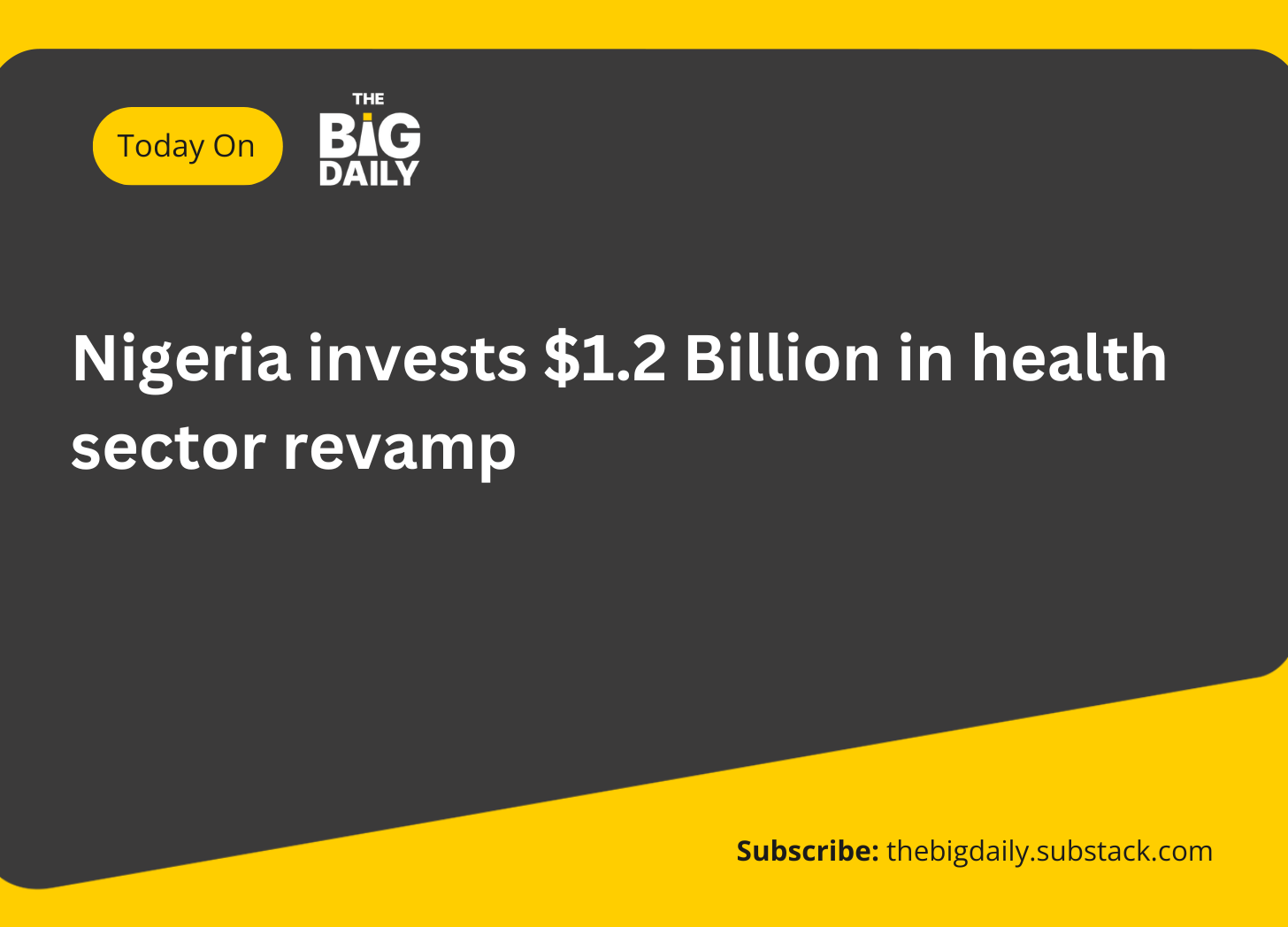Good morning, Big Brains. Still on the promise of not suffering in silence, the universe did its big one again yesterday. I don’t even know where to start from because it looks like I have bigger fish to fry as a Nigerian. Tell me what you think of the controversial withdrawn bill when you’re done reading the newsletter.
- Margaret
Word count: ~700
Reading time ~3 mins
Let’s get into today’s edition:
Nigeria invests $1.2 Billion in health sector revamp
House withdraws bill proposing 10-year jail term to anyone refusing to sing new anthem
The Big Deal
Nigeria invests $1.2 Billion in health sector revamp
Nigerians have been eating more than one apple daily to keep decreasing doctors away but Tinubu’s “Renewed Hope” is finally renewing the health sector.
The Federal Ministry of Health, along with state ministries and partners, has kicked off a $1.2 billion initiative called the Sector-Wide Approach (SWAp) to improve Nigeria’s healthcare system. Dr Muntaqa Umar-Sadiq, the National Coordinator, revealed that SWAp is designed to tackle big issues like underfunding, staff shortages, poor data management, and crumbling infrastructure.
The goal of the plan is start-up level ambitious—aiming for better access to quality healthcare for every Nigerian, no matter where they live or how much they earn.
Why is this a big deal?
We hate to sound like broken records but Nigeria's healthcare system is in critical condition. With one of the world’s highest maternal mortality rates and a severe lack of healthcare workers, the situation gets worse every day. Nigeria currently spends just 3% of its GDP on healthcare. The numbers are bad enough but despite that fact, nearly half of that budget doesn’t get used effectively. SWAp is expected to change that by ensuring funds are used where needed most.
If all things go well, by 2027, Nigeria should have a better healthcare system that can meet its people's needs.
House withdraws bill proposing 10-year jail term to anyone refusing to sing new anthem
Prominent figures and every other Nigerian on X have criticised a messy House of Representatives bill that would have landed anyone 10 years in jail for refusing to recite the old-turned-new national anthem.
We want to say sike so bad but Speaker Tajudeen Abbas was pushing this bill, which also punishes those who damage national symbols or set up illegal roadblocks. It seemed like some other members of the House were also rooting for this bill.
But Nigerians were obviously not in support. In May, President Tinubu reintroduced Nigeria's old national anthem, "Nigeria, We Hail Thee” to replace “Arise O Compatriots”. For Nigerians like Aisha Yesufu, this doesn’t make a tiny bit of sense, especially because the former anthem was composed by actual Nigerians and the new anthem wasn’t.
Activists like Aisha Yesufu and Obiageli Ezekwesili took to social media, vowing to stick with the current anthem, "Arise O Compatriots," no matter the consequences. Ezekwesili even called the bill a "silly flight of fancy" and warned lawmakers to get ready to "prosecute" her.
Even though the bill has now been withdrawn…
Speaker Tajudeen must have seen the outrage on social media because he withdrew the bill yesterday afternoon. But the fact that such a controversial bill was even considered at all sent an alarming message to Nigerians. Some people believe that the government is trying to enforce loyalty and control public expression. While others believe that the bill was supposed to distract people from real issues like governance and freedom of speech, showing how disconnected lawmakers are from the public’s concerns.
This Week’s Big Question
“If could get a nepo-advantage to become an Olympian, what sport would you play?”
Tunde’s response - “I’d choose table tennis. I already have the wrist action from playing with the guys!”
You can also share your response here and if it’s as interesting as Tunde’s response, we’ll feature it in the next edition.
The Big Picks
MTN Nigeria CEO Tortola Warns Of ‘Deep Crisis’ in Telecoms Sector, Calls For Price Increase: The telecom CEO pointed out the serious challenges telecom operators face in staying sustainable, even with the growth seen over the last 20 years since the industry opened up.
Most Lagosians earn less than ₦100,000 monthly, PaidHR survey shows: If you make over ₦200,000 a month, you're in a special class in Lagos. The majority of workers (78%) in Nigeria's commercial capital earn less than ₦100,000.
If you enjoyed this edition of the newsletter, don’t forget to subscribe and share. You can also leave feedback for us in the comments or by filling out this form.






